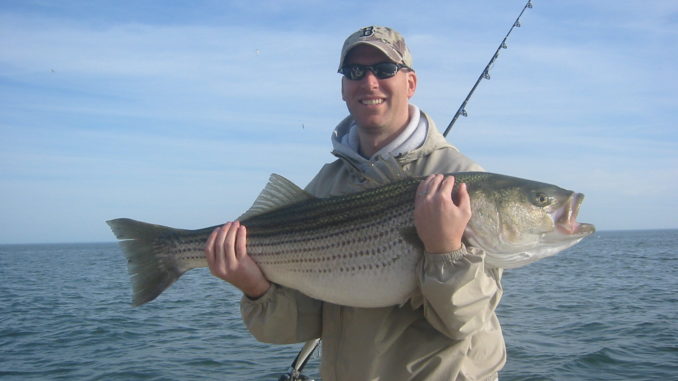
Would protect red drum, speckled trout and stripers from commercial fishing
A bill to designate red drum, spotted seatrout and striped bass as gamefish was entered in the North Carolina House of Representatives today (March 15).
The bill, H 353, had four primary sponsors, including Darrell McCormick (R-Iredell, Surry, Yadkin), Rick Glazier (D-Cumberland), Dan Ingle (R-Alamance) and Ruth Samuelson (R-Mecklenburg).
Alice Bordsen (D-Alamance) signed as a co-sponsor, but other legislators are likely to join her.
H 353 would “prohibit the taking of coastal gamefish other than by hook and line, prohibit the sale of coastal gamefish” and “would compensate commercial fishermen for certain losses due to the designation and prohibition.”
The bill, in effect, would make reds, specks and stripers legal targets only of recreational fishermen and prohibit their netting for barter or sale. It is the second bill in North Carolina’s history to ask for protection of coastal saltwater fish from netting but the first to have a real chance of becoming law.
“It was time,” Rep. Ingle said. “My signing on as a co-sponsor came out of my concern for North Carolina’s coastal fisheries. I’ve been following the red drum for a long time. It’s our state fish. And I know how poor the situation has become with spotted sea trout.
“Plus, this situation came more to (the Legislature’s) attention when we had the big striped bass kills because of the super trawlers.”
A somewhat similar bill (H 918) to protect red drum and speckled trout under a gamefish designation was introduced into the Democrat-controlled General Assembly last session but died in a committee without reaching the House floor for debate. The 2011 General Assembly is controlled by Republicans.
Recreational sportfishing groups such as the Coastal Conservation Association of North Carolina, Coastal Fisheries Reform Group and the Recreational Fishing Alliance prodded the Legislature to enact this bill because of what they saw as lack of action to protect these species by the North Carolina Marine Fisheries Commission, a nine-member group appointed by the governor that controls saltwater fisheries management.
A Feb. 11 decision by the MFC to stop until June 15 recreational fishing for spotted seatrout (aka speckled trout or “specks”) while allowing commercial fishermen to continue to net them in coastal creeks and marshes was met with severe criticism.
Specks are classified as “overfished and depleted” by the North Carolina Division of Marine Fisheries, an agency that is the professional arm of the MFC. Yet the MFC asked the DMF during the 2010 legislative session to that omit the species from the General Assembly’s Spotted SeaTrout Fisheries Management Plan.
The speckled trout FMP would have taken drastic measures (netting reductions, size and limit reductions for recreational anglers) to ensure that speck numbers could have a fair chance to rebound from years of overfishing.
Then, during January and February, two highly publicized and massive kills of ocean-run striped bass caused by trawl boats put this species on the radar for legislators.
The MFC responded to the two mid-January striped bass kills, which observers near Oregon Inlet estimated in the thousands of fish, by re-opening the trawling season and allowing a 60,000-pound catch quota to be filled.
On Jan. 20, DMF’s Louis Daniel changed commercial fishing regulations. Instead of a 50-biggest-fish haul, Daniel legalized a 2,000-pound trip limit per boat and transfer of excess, legal-size fish from one trawl boat to another on the water. But when he reopened the season Feb. 3-4, trawl boats once again left hundreds of dead and floating stripers in their wakes.
Red drum, listed as the official state fish of North Carolina, also undergo threats from commercial netters targeting flounder and striped mullet. Commercial netters may keep up to 10 reds per day caught “incidentally” in nets set for those other species.
Meanwhile hook-and-line anglers are restricted to one red drum per day between 18 and 27 inches in length.
North Carolina is one of the few states on the southeastern seaboard allowing netting of these fish for sale. Virginia, South Carolina, Georgia, Florida, Louisiana and Texas all classify reds and specks as gamefish and don’t allow them to be netted.
The final provision of the bill would distribute $1 million from the DMF’s Marine Trust Fund to anglers who can show a substantial financial loss (average yearly income loss from 2009-2010, plus cost of equipment) from not being allowed to net these fish in the future. These payments would be spread over 2012, 2013 and 2014.


Be the first to comment